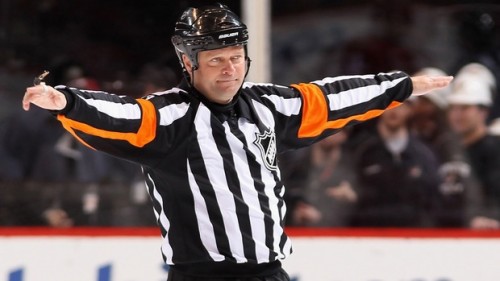Why NHL refs should have to face the media

PK Subban’s slash on Mark Stone. Patrick Kane’s goal with too many men. And, well, take your pick from any number of incidents between the Calgary Flames and Vancouver Canucks. Each is different and yet all are similar. The uniting factor: the action (or inaction) by the referees created oodles of controversy.
What’s worse: while players – especially those involved – and fans continued to stew over the events of the respective games, the refs escaped with nary a mic, nor a camera coming close to them. This is a narrative that has played out multiple times in the past and seems to be magnified even more in the playoffs – perhaps because everything else is also magnified in the playoffs.
So it’s about time the NHL took a proactive approach to the problem by forcing refs to have their own post-game media availability, upon request, with inquiring reporters. Not necessarily after every game – sometimes the refs just wouldn’t have anything to say – but at least when the media requests it.
If the NHL’s brass is looking for an example of how to put such an idea into practice, it need look no further than one of the other professional sports. Major League Baseball has allowed its umpires to speak with the media in the past. The most prominent example that comes to mind involved Jim Joyce, Armando Galarraga and a near-perfect game.
Although Joyce’s meeting with the media likely didn’t take the sting out of having a nearly historical feat dashed, some solace could be found in the fact he had to explain himself. His admission that “I did not get the call right” was perhaps shocking, given the reluctance of most officials to admit their mistakes, but more importantly provided at least a little closure.
While such a candid and honest reaction as the one Joyce provided can’t – and shouldn’t – be expected from all officials, it was refreshing to see an umpire take accountability for his actions. If forcing referees in the NHL to have their own media availability accomplishes nothing else, it will at least create a better sense of accountability.
With the threat of a potential meeting with the media looming, a ref may be more inclined to call that borderline check from behind, or show some restraint before making a weak even-up call. Regardless of the situation, there will at least be some incentive for the refs to be more cognizant of the calls they make: get it right, or answer for it later.
Some may argue that dealing with the media would just add to the list of cons of being a ref – in addition to dealing with screaming players, coaches and fans – but the players they officiate have to deal with the same external pressures, so why not the officials too? It might take some time to get used to, but soon enough it would just be part of the job.
And, on top of providing closure, talking to the media would also give refs a chance to defend themselves, or at least explain what their reasoning was for making a call.
Not sure why Subban was ejected for that slash on Stone or how the Chicago Blackhawks got away with having too many men on Kane’s goal? Perhaps hearing the refs recount the situation will create some understanding, or it might incite more anger, but it’s better than speculating or letting them off the hook altogether.
Granted, hearing from the refs after the game won’t do much during the course of the game, but it’s better than the current system – one that is lagging behind compared to other leagues. The NHL is often resistant to change, but the fact is it can’t continue to operate with the status quo, not in an era where being open and accountable isn’t in an option, but necessity.

